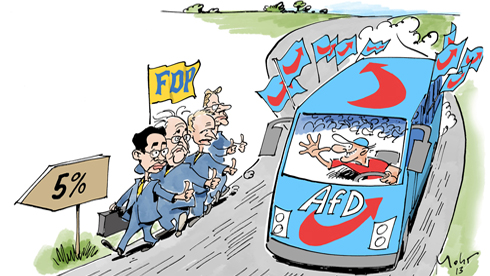“Greece should never have been admitted into the eurozone.” Less than three weeks before the September 22 elections, Angela Merkel rolled out the heavy artillery on August 28. The German Chancellor has every chance of being re-elected. Her party, the Christian Democratic Union (CDU), is expected to pick up from 39 to 42 percent of the votes, against 22 to 25 for the Social Democratic Party (SPD) of her rival Peer Steinbrück.
Some polls even give her a cumulative 47 percent by adding the votes for her current partner, the liberal party (FDP), which would allow the coalition to govern together for four more years. In reality, the strong language of the CDU candidate reflects a new nervousness in the German election campaign, which has been distinguished so far by its monotony.
In stigmatising Greece, the front-runner is attacking not only former Chancellor Schröder of the SPD, whom she accuses of having let Athens into the eurozone in 2001; after all, as she recalled during the televised duel on Sunday evening, the SPD has supported all the plans to bail out Greece that were brought to Parliament for a vote. The other opponent Angela Merkel is attacking is none other than the new Eurosceptic party Alternative for Germany (AfD).
Credited with three percent in the opinion polls, the outfit that was formed in the spring is one of the biggest unknowns of the September 22 election. However, since finance minister Wolfgang Schäuble reopened the debate on Greece by declaring in late August that there “still must be an aid plan” for the country in crisis, the new party is enjoying an unexpected context to promote its flagship project: the splitting up of the eurozone into northern and southern zones.
Underestimated AfD
Pollsters are beginning to recognise that the AfD could get a higher vote than the opinion polls are currently suggesting. Allensbach estimates that eight percent of voters are not ruling out voting for this party, led by an economics professor. “The electoral potential of AfD has been underestimated,” says Bettina Munimus, Professor of Political Science at the University of Kassel. “The party is a haven for all the conservative voters disappointed by the CDU and its European policy.”
A key element behind her assertion: the demography. Of 62 million people eligible to vote, one-third, or more than 20 million, are retirees. According to the Foundation for the Market Economy, “the 2013 election should be the last election for decades in which the majority of voters will be under the age of 55.”
*Read the whole article here.






Be the first to comment on "On the Right, Eurosceptics steal Merkel’s show"